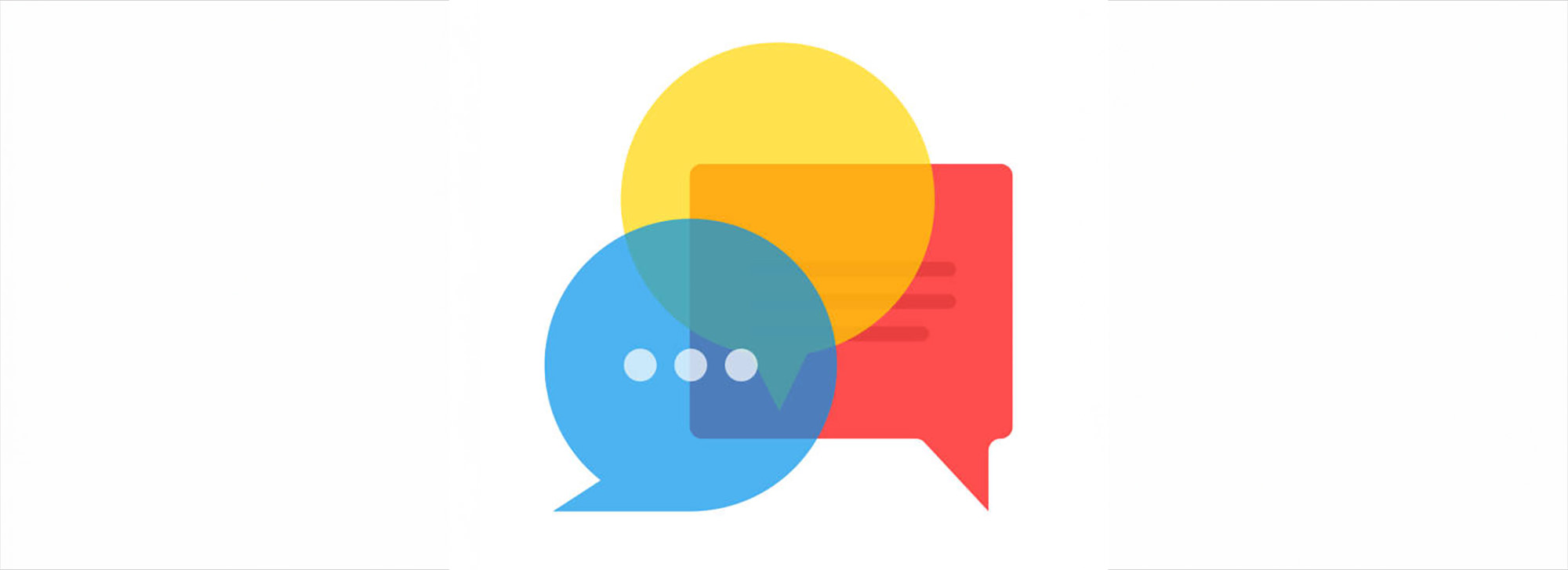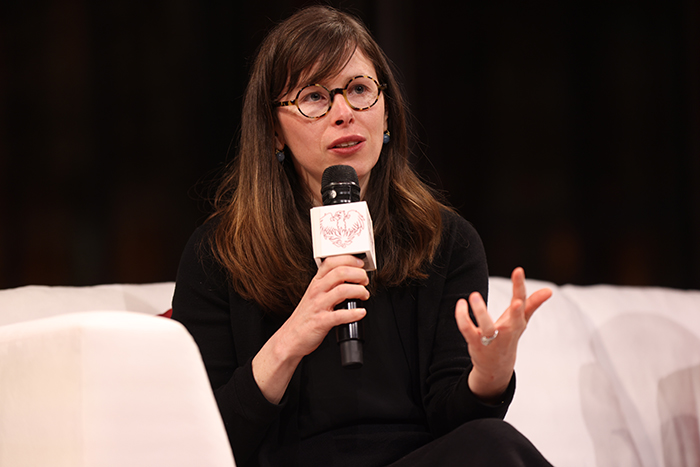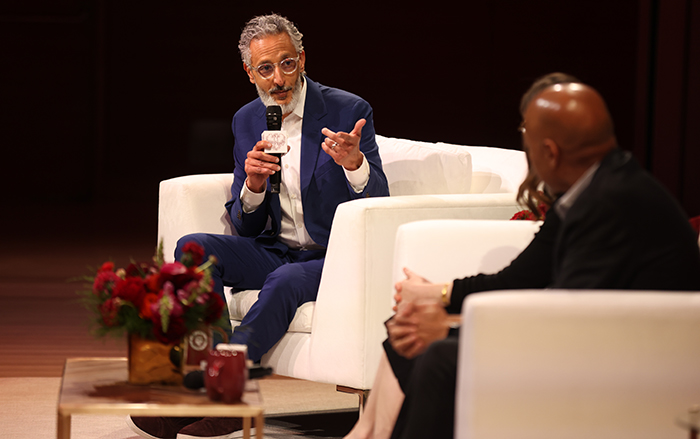
(iStock.com/The_Believer_art)
At an alumni event this spring, panelists discussed threats to higher education in light of a foundational UChicago value.
This past April, UChicago Alumni and the University of Chicago Forum for Free Inquiry and Expression cohosted “Uninhibited Debate: How UChicago Shaped Free Expression Discourse.” Gathering in New York City to discuss UChicago’s historical commitment to free and open discourse—and current and ongoing challenges to fostering it—were Assistant Professor of Law Bridget Fahey, AB’08; Kenneth Warren, Fairfax M. Cone Distinguished Service Professor in the Department of English Language and Literature; and Tony Banout, PhD’12, executive director of the Chicago Forum, who moderated. Highlights of their conversation follow. This material has been edited and condensed.—L. D.

Tony Banout There’s a quip that is popular for all of us who have an affiliation with the University of Chicago: That’s all good and fine in practice, but how does it work in theory?
I want to start by inverting that. This concept of uninhibited debate sounds like a Platonic ideal—especially now, when all kinds of forces are, in fact, inhibiting students, scholars, and our communities. To start, I would invite each of you to talk about what you think are the most pressing forces inhibiting debate at the University of Chicago and in higher education.
Bridget Fahey I join so many colleagues across the country in being deeply concerned about the White House’s use of research funding to encourage faculty, students, and universities to speak, or refrain from speaking, on politically disfavored topics. And I know we will have ample opportunity to discuss those pressures tonight.
But those threats are not the only aspect of our speech ecosystem that requires constant tending. Even absent external pressures—even during the best of times—uninhibited debate only thrives at the University of Chicago because of deliberate pedagogical nurturing. I worry, for example, about the tendency among law students to self-edit their views. They see the legal profession becoming more polarized. And I think some see their career goals bound up with establishing the right record of ideas during law school. Curating that record, though, inhibits the kind of playfulness with ideas, experimentation, debate, and need sometimes to play devil’s advocate that are so important to the law school education.
To give you just one example of how we use pedagogical technique to counter those speech-inhibiting tendencies in the classroom, we are one of the few law schools that continues to almost universally “cold call” our students during class. If you’ve seen The Paper Chase, you have a sense of the method: We call on students at random, and we ask them to defend a wide range of positions—including many they probably would not adopt as their own. I also, for example, ban computers in my classroom so that when students hear a classmate speaking, they turn, and look, and listen—they engage in the kind of interpersonal behavior necessary to uninhibited debate.
This is to say, to sustain our commitment to free expression, we have to think both externally and internally.

Kenneth Warren We last spoke about this at the January 31 event commemorating the 10th anniversary of the Report of the Committee on Freedom of Expression. I think that moment was buoyant in a certain way. Despite all that had happened in the wake of October 7, 2023, and the real challenges that our and other campuses had experienced, we felt that those principles had been tested, some inadequacies had emerged, but by and large, we as a community could still be guided by them.
The world has changed dramatically since then. That discussion was focused on how foundational freedom of expression is for the purpose of the University—for fulfilling its research and pedagogical missions. Now we are struggling and striving to establish the legitimacy of institutions to exercise their own legitimate power and to reflect on how to fulfill their missions.
Banout I think what you’re saying is, these times are so challenging that even for the University of Chicago, having very firm footing in principles that are foundational to who we are, they feel rather unprecedented.
Warren This does feel, certainly in my lifetime, like an unprecedented moment. So while we need to and ought to reaffirm and revisit the Chicago Principles themselves, we need as a society to assert forcefully, without being apologetic about it, that we are all part of the polity and on that basis we have a right to assert our view without fear of being exiled, deported, and silenced by the unprecedented use of executive power—crucially in those institutions where we can work collectively to realize our vision of what a society really ought to be.
Fahey I agree—this could not be a more profound moment for universities and the conditions that allow us to thrive. If you study federalism, as I do, you think frequently about the risks of concentrating power. Our system of federalism divides power between the federal government and the states to prevent the problems that flow from its over-concentration. That same concern also argues for the importance of separating power between public and private entities. Universities are essential institutions to our civic, economic, and social lives that, like states and cities, require independence from federal control to serve their important functions.
And I think we should see the University of Chicago’s free expression principles as a powerful articulation of the need for—and function of—that independence. We cannot produce knowledge if research answers are dictated from above. That’s true whether it’s the president of the University or the president of the nation seeking to guide our intellectual process.
Banout How do you think about that challenge vis-à-vis specific elements of the UChicago tradition?
Fahey Extending the last point, the Kalven Report, one of the fundamental documents articulating our free expression principles, reads to me like a structural document as much as a rights document. It is about the organization of the University—in both inward and outward orientation. It articulates the idea that power over questions related to the production of knowledge must be diffused to the periphery—to units, faculty, and students. And their independence of thought must be relentlessly safeguarded from internal and external control, lest the necessarily organic process of learning, questioning, arguing, hypothesizing, and testing ideas collapse.
It has been heartening to see so many peer schools adopt commitments like the Chicago Principles. And I hope that the principles’ insights about institutional design can guide not only the University of Chicago but our broader community of universities in this difficult moment.
Banout In addition to Kalven, when people think about the Chicago position, they refer to the Chicago Principles and the committee that you served on, Ken, to produce them. When you think about the work of the committee and how you looked deeply into the tradition, does that fortify you for how you think about the current moment?
Warren I was on the committee, and we never used the term “Chicago Principles” in that process. When we wrote the report, we saw ourselves primarily as writing an internal document, not as making a statement for all universities or for time immemorial. So I have mixed feelings about the focus on the report as something to be adopted. That left out the process by which all of these reports were written and the importance of faculty governance as a structure for producing the principles through which an institution seeks to state its ideals and to live by those ideals.
If you’re going to have these principles work, they can’t work in isolation. You have to stipulate the authority of the faculty and the institution to address issues that the institution has, to come up with their best possible solution, and to subject that solution to periodic and rigorous review.
When entities outside the institution declare a crisis needing immediate response, this can become the pretext for not allowing the processes that are in place within institutions to do their work. In that context, you can’t have anything like a community committed to freedom of expression.

Banout There are many who would say things were not peachy at universities before. There were issues of lack of viewpoint diversity, especially in certain disciplines. There was politicization of disciplines and faculty. The argument I hear sometimes is that universities were not reforming themselves, so you needed an outside force to prompt the reform. What’s wrong with that argument?
Warren One way I think about that is, name me a major institution in this country that does not have serious problems. They all do, right? The University of Chicago is no exception to that. The question is whether or not you have people within those institutions who have the capacity to recognize those imperfections and who are committed to trying to fix them. Universities absolutely need to be criticized, and so does every other institution in this country. But when do you decide that an institution is incapable of addressing its own problems and use that as a pretext to override all procedures and standards for imposing its own fix? That’s where the danger lies.
I bristle at that as a line of justification, because it can be used at any given moment for any institution. In its worst manifestation, it authorizes any kind of action in response. To turn to the legal scholar, the constitutionality of that action is what is now in question, right?
Fahey Yes. The idea that the federal government might try to use its substantial funding to coerce behavior is not new—the federal government has attempted just that with respect to the states on many occasions. To combat that risk, there are multiple layers of legal protection for the recipients of federal grants and contracts. There are separation-of-powers constraints on the president’s ability to “impound” funds duly appropriated by Congress; there are statutory constraints on the president’s discretion to disturb recipients’ reliance interests; there are regulatory constraints on how agencies must justify funding changes; there are due process constraints entitling recipients to challenge funding withdrawal.
And particularly relevant here, there are First Amendment constraints on the federal government’s capacity to use funds to shape recipients’ speech. For example, although the federal government can impose expressive restrictions that directly relate to a program’s objective—in order to ensure that the federal government is spending money on the things it wishes to spend money on—it can’t leverage funding for one program to induce speech outside that program’s boundaries. But that is exactly the structure of many recent threats against universities.
I predict that we will see high-profile First Amendment challenges to a range of the government’s funding actions. But I also hope that funding recipients will remember the importance of asserting due process rights. One of the central purposes of due process is to narrow the scope of an alleged claim to wrongs over which the government has legal jurisdiction and which are supported by the facts. It separates lawful governmental action from unlawful pretext.
Banout There’s maybe a more meaningful violation of the First Amendment in using the power of the purse to drive ideological conformity or prohibit ideological dissent.

Fahey One of the frustrating aspects of the threats we are seeing is the absence of a clear legal document explaining exactly what universities have done to be in the administration’s crosshairs. We can glean a bit from press releases, news conferences, and letters to our peer schools. But it’s hard to isolate exactly what the government’s legal theories—and even basic objectives—are.
What is clear is a strategy to threaten first, frequently, and broadly—and to clarify the legal basis only when pressed.
Banout Yes, and the chilling effect is real. Being on campus and talking to colleagues and students, it is very much present.
Warren I do think that is true. As you mentioned, you have students who are worried about how what they say in any given moment will affect their careers down the line. The possibility of self-censorship is real.
If we go back to the fact of real problems on campus, I served as the deputy provost for research and minority issues in the early aughts. That was a term for what became known as a diversity officer. I was charged with looking, across the entirety of the University’s operations, at questions dealing with prejudice, inequality, and non-inclusiveness. We were doing our best, as we saw it at that moment, to address bigotry, racism, anti-Semitism, and the like. The question was, how do we create a more inclusive environment? What policies would serve that? What policies weren’t conducive to those ends?
Did we end racism at the University of Chicago? Of course not. At that moment there was a great deal of anxiety among our Muslim students, stemming from the long shadow cast by 9/11. What we saw was that at a given moment, any number of students on campus felt, and had reason to feel, that for one reason or another they weren’t necessarily fully welcome.
What we had to do was redouble our efforts to redress that. In my experience, the extent to which different groups of students feel embattled and aggrieved changes in accordance with national and international issues. To deny the complexity of how you address real feelings that are tethered to real events that have made life difficult for so many of our students is, I think, doing a disservice to the issues themselves if we indeed are going to solve them.
